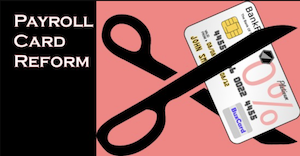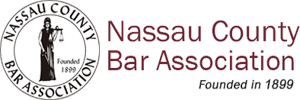- Free Consultation: (212) 991-8960 Tap Here to Call Us
New York AG Proposes Payroll Card Reform

This morning, New York Attorney introduced the Payroll Card Act, proposed legislation regulating the use of payroll cards.
Mandatory use of payroll cards has been roundly criticized by workers and numerous government agencies because of the lack of consumer choice and exposure to unfair, unavoidable, and/or hidden fees.
In announced the legislation, Attorney General Eric Schneiderman said,
Workers should not have to pay unfair fees in order to cash their paychecks … “While payroll cards can be helpful for employees without bank accounts, programs often impose fees that chip away at people’s hard-earned wages. The Payroll Card Act will ensure that workers have free and clear access to their wages, while providing clarity to employers about how to offer payroll cards in compliance with the law.
If signed into the law the Payroll Card Act will bring meaningful reform and curtail some of the most egregious acts of worker exploitation caused by implementation of the use of payroll cards. First, employees would have the right to decide whether they will be paid through a payroll card, direct deposit or paper check.
Second, the law would require that employees receive clear notice of payroll card program terms and conditions, including potential fees and ways of avoiding those fees.
Third, employers would be prohibited from using payroll card programs that charge certain types of fees, and require them to use payroll card programs with at least one network of ATMs where employees can obtain access to their wages without paying a fee.
Last year, AG Schneiderman’s office issued a report titled, Pinched by Plastic: The Impact of Payroll Cards on Low Wage Workers identifying numerous problems and abuses in the payroll card industry, including the following.
Cardholder employees were often given insufficient information about how to obtain their wages without incurring a fee and, where the employer provided detailed fee data, approximately 75% of cardholder employees incurred some kind of fee while attempting to access their wages.
In some programs, fees reached as high as $20 per employee per month, on average. Workers were steered or required to be paid by payroll card: 40% of employers surveyed did not provide employees with the option of receiving their wages by a traditional paper check, and an additional 31% discouraged the selection of a paper check.
Many programs failed to provide sufficient means for workers to withdraw wages without incurring fees. One employer’s payroll card vendor brought in almost $70,000 in fees for fewer than 5,000 cardholder employees during a one year period, of which over $60,000 were for ATM transactions alone, the majority of them to access wages or check account balances.
More than one-third of employers used payroll card programs that included overdraft fees. One payroll card vendor received over $200,000 in overdraft fees from August 2012 to July 2013, with an average of 2,570 accounts open each month.
Worker exploitation through an employer’s mandatory use payroll cards first came to national attention in 2013 when Natalie Gunshannon, a former McDonald’s franchise employee filed a class action wage theft lawsuit against her employer arguing that it was illegal for an employer to require worker’s to be paid on a payroll card.
While the franchisor responded by changing its policy, a McDonald’s spokesperson took no responsibility, noting “franchisees are responsible for, and make their own decisions around, employment and pay related matters.”
Gunshannon later published a petition on Change.org asking McDonald’s CEO Don Thompson to establish a policy precluding franchisees from scalping workers through the mandatory use of payroll cards laden with heavy fees. The petition received more than 300,000 supporters.
The Consumer Financial Protection Bureau, an independent agency of the U.S. Government, issued a bulletin warning employers and financial institutions that Payroll Cards were subject to the Federal Electronic Funds Transfer Act, which “prohibits employers from mandating that employees receive wages only on a payroll card of the employer’s choosing.”
We here at the Marlborough Law Firm applaud Ms. Gunshannon and Attorney General Schneiderman for their efforts in seeking serious reform. We look forward to the passage of the Payroll Card Act and hope that other states take appropriate steps to address this nationwide problem.
Download attachments:











